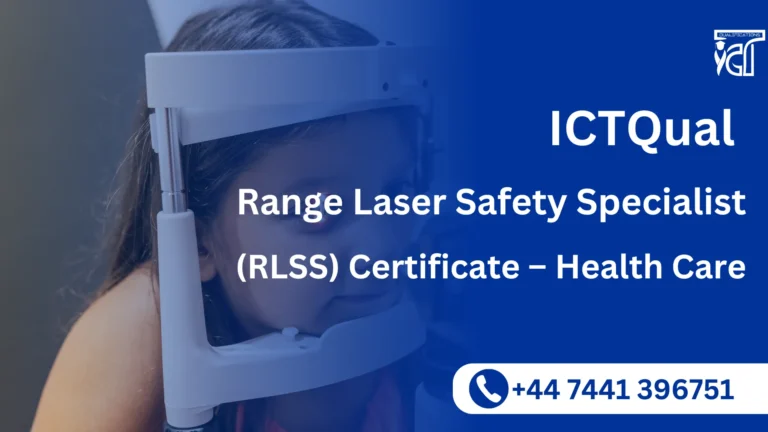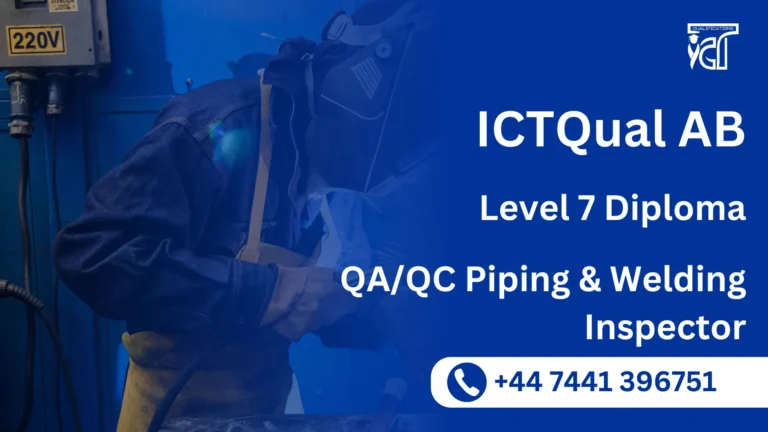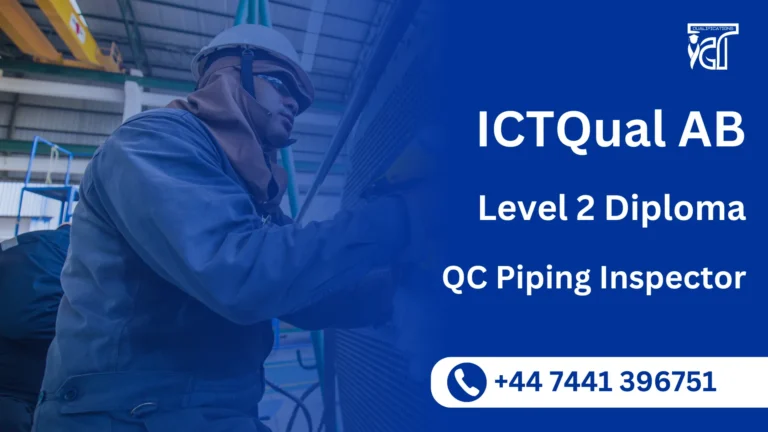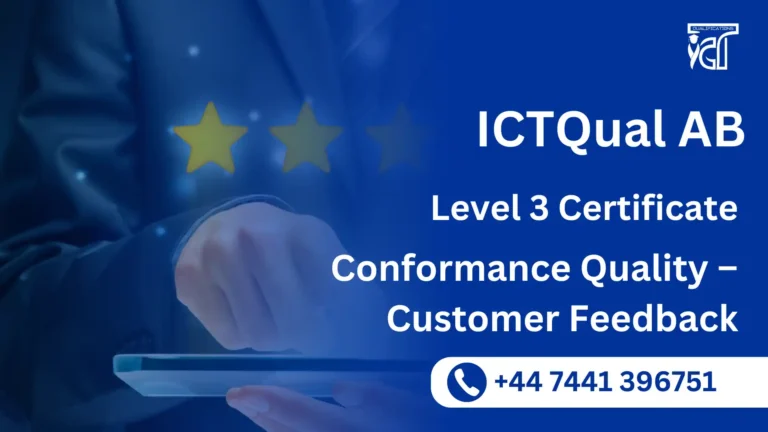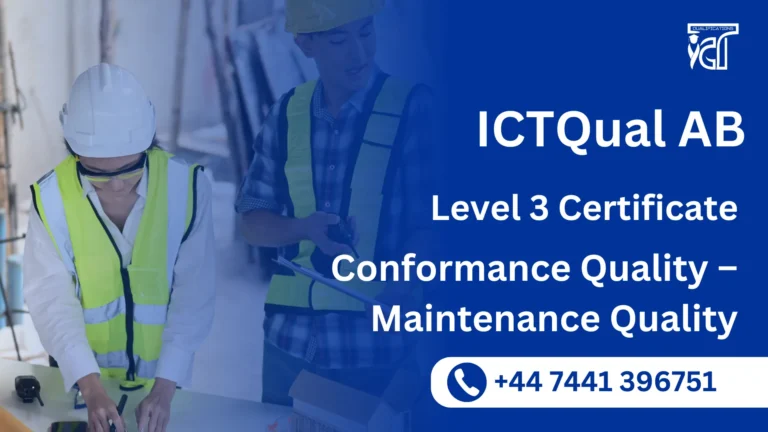The ICTQual AB Level 5 Diploma in QA/QC Piping and Welding Inspector is a specialized qualification designed for learners and professionals seeking to build a strong foundation in inspection and quality assurance. This program introduces essential principles of QA/QC practices, equipping participants with the technical knowledge and practical skills required to begin or strengthen their careers in piping and welding inspection.
Learners at this level gain a thorough understanding of inspection methodologies, welding processes, defect identification, and material properties. The course also provides exposure to international codes and standards such as ASME, API, ISO, and AWS, ensuring participants are prepared to meet industry compliance requirements. Emphasis is placed on documentation, reporting, and the application of quality systems in real‑world projects.
The diploma is tailored for individuals aiming to enter or progress within technical industries such as oil & gas, construction, manufacturing, and power generation. It is particularly suitable for those seeking to move into QA/QC roles, inspection positions, or technical support functions. By combining theoretical knowledge with practical applications, the program prepares learners to contribute effectively to project quality and safety.
Successful completion of this qualification enhances employability and provides a clear pathway to advanced diplomas, specialized certifications, and international recognition. It establishes learners as competent professionals in QA/QC piping and welding inspection, opening opportunities for career growth and progression into supervisory and specialist roles.
ICTQual AB Level 5 Diploma in QA/QC Piping and Welding Inspector
This qualification, the ICTQual AB Level 5 Diploma in QA/QC Piping and Welding Inspector, consists of 6 mandatory units.
| Sr# | Unit Title |
| 1 | Integrated QMS & Lean Inspection Processes for Welding Industries |
| 2 | Complex Piping & Welding Systems: High Pressure & Exotic Alloys |
| 3 | Corrosion Control, Coating Inspection & Integrity Management |
| 4 | Quantitative Risk Assessment & Business Continuity Planning |
| 5 | Quality Governance, Contractual Compliance & Stakeholder Reporting |
| 6 | Continuous Improvement Tools: Six Sigma, Kaizen & Performance Metrics |
Learning Outcomes for the Study Units:
Integrated QMS and Lean Inspection Processes for Welding Industries
By the end of this unit, the learner will be able to:
- Apply quality management system (QMS) principles to welding inspection workflows.
- Integrate lean methodologies to enhance efficiency in inspection processes.
- Evaluate inspection protocols in alignment with international welding standards.
- Identify and reduce waste in QA/QC practices within welding industries.
Complex Piping and Welding Systems: High Pressure and Exotic Alloys
By the end of this unit, the learner will be able to:
- Interpret technical specifications for complex piping and welding assemblies.
- Assess inspection and testing procedures for high-pressure systems and exotic alloys.
- Recognise challenges associated with material selection and welding compatibility.
- Implement safe inspection techniques for critical system components under stress conditions.
Corrosion Control, Coating Inspection and Integrity Management
By the end of this unit, the learner will be able to:
- Identify various forms of corrosion affecting industrial piping and welded structures.
- Evaluate protective coatings and inspection criteria to ensure long-term asset integrity.
- Develop corrosion mitigation plans using industry-approved practices.
- Apply integrity management systems to track degradation and maintenance schedules.
Quantitative Risk Assessment and Business Continuity Planning
By the end of this unit, the learner will be able to:
- Perform quantitative risk assessments for QA/QC and operational activities.
- Use risk matrices and statistical tools to prioritise inspection-related hazards.
- Design business continuity strategies for quality-critical environments.
- Align risk planning with organisational resilience and regulatory requirements.
Quality Governance, Contractual Compliance and Stakeholder Reporting
By the end of this unit, the learner will be able to:
- Interpret legal and contractual obligations within QA/QC frameworks.
- Demonstrate quality governance principles in compliance with industry standards.
- Develop and deliver accurate QA/QC reports to internal and external stakeholders.
- Monitor supplier and contractor compliance through structured quality audits.
Continuous Improvement Tools: Six Sigma, Kaizen and Performance Metrics
By the end of this unit, the learner will be able to:
- Apply Six Sigma tools (DMAIC) and Kaizen methodologies to QA/QC processes.
- Interpret and use performance metrics to measure inspection efficiency.
- Lead quality improvement initiatives within piping and welding operations.
- Foster a culture of continuous improvement across inspection teams.
The ICTQual AB Level 5 Diploma in QA/QC Piping and Welding Inspector provides learners with a strong foundation in inspection and quality assurance. It is designed to equip participants with essential technical knowledge, practical skills, and industry‑relevant competencies that prepare them for entry‑level and mid‑career QA/QC roles.
1. Technical Knowledge Development
- Solid understanding of QA/QC principles in piping and welding inspection
- Introduction to international codes and standards (ASME, API, ISO, AWS)
- Knowledge of welding processes, materials, and defect identification
- Skills to apply inspection methodologies in real‑world projects
- Competence in documentation and compliance systems
- Preparation for handling routine inspection tasks with confidence
2. Professional Skills Enhancement
- Development of reporting and communication skills for technical environments
- Ability to conduct basic audits and support quality systems
- Problem‑solving skills for inspection challenges in piping and welding
- Improved teamwork and collaboration in QA/QC projects
- Confidence in applying inspection techniques under supervision
- Foundation for leadership skills in future career progression
3. Career Opportunities
- Eligibility for QA/QC inspector roles in oil & gas, construction, and manufacturing sectors
- Recognition as a qualified professional in piping and welding inspection
- Strengthened employability with an internationally respected qualification
- Opportunities to progress into specialist or supervisory positions
- Career mobility across diverse technical industries
- Clear pathway toward advanced diplomas and certifications
4. Long‑Term Progression
- Preparation for Level 6 and higher QA/QC programs
- Foundation for lifelong learning and continuous professional development
- Access to international career opportunities and industry networks
- Ability to contribute effectively to project quality and safety
- Recognition as a competent entry‑level QA/QC professional
- Gateway to advanced study and global career growth
The ICTQual AB Level 5 Diploma in QA/QC Piping and Welding Inspector is designed for learners who are building their careers in inspection and quality assurance. This program is suitable for individuals seeking to strengthen their technical knowledge, gain practical skills, and prepare for entry‑level to mid‑career roles in piping and welding inspection.
1. Academic and Educational Background
- Learners with prior completion of Level 4 QA/QC diplomas or equivalent qualifications
- Candidates with educational backgrounds in mechanical, civil, or welding engineering
- Individuals familiar with basic QA/QC principles and inspection practices
- Those seeking academic progression into advanced QA/QC programs
- Learners motivated to validate their technical knowledge with an internationally recognized qualification
- Participants aiming to strengthen their academic profile for career advancement
2. Professional and Career Aspirations
- QA/QC inspectors aiming to progress into supervisory or specialist roles
- Professionals working in oil & gas, construction, manufacturing, or power generation sectors
- Individuals seeking recognition as skilled practitioners in piping and welding inspection
- Candidates preparing for consultancy or project management responsibilities
- Learners aiming to contribute to global projects requiring QA/QC expertise
- Those motivated by long‑term career growth and international opportunities
3. Skills and Competencies
- Basic analytical and problem‑solving skills for inspection challenges
- Ability to apply international codes and standards (ASME, API, ISO, AWS)
- Competence in defect identification, analysis, and reporting
- Proficiency in documentation and compliance systems
- Skills in conducting audits and supporting quality frameworks
- Confidence in applying inspection methodologies under supervision
4. Personal Attributes and Suitability
- Learners with a proactive and detail‑oriented mindset
- Individuals committed to professional development and lifelong learning
- Candidates with teamwork and collaboration abilities
- Professionals eager to gain international recognition and credibility
- Learners who value structured progression pathways in QA/QC management
- Those seeking confidence to oversee technical projects and ensure compliance
The ICTQual AB Level 5 Diploma in QA/QC Piping and Welding Inspector provides learners with a strong foundation in inspection and quality assurance. Successful completion of this qualification opens doors to advanced study, specialized certifications, and career growth in technical industries.
1. Academic Progression
- Pathway to the ICTQual AB Level 6 Diploma in QA/QC Piping and Welding Inspector
- Eligibility for advanced diplomas in QA/QC, inspection, or engineering management
- Opportunity to pursue specialized certifications in welding inspection, NDT (Non‑Destructive Testing), or safety compliance
- Preparation for internationally recognized qualifications from ASME, API, ISO, and AWS
- Foundation for lifelong learning and continuous professional development
2. Career Development
- Progression into entry‑level and mid‑career QA/QC roles in oil & gas, construction, and manufacturing
- Opportunities to work as junior inspectors, QA/QC coordinators, or technical support staff
- Ability to contribute to inspection teams and compliance frameworks in project environments
- Recognition as a qualified professional in piping and welding inspection
- Enhanced employability for local and international projects
3. Professional Recognition
- International recognition of qualification for global career advancement
- Credibility with employers seeking trained QA/QC professionals
- Access to industry networks and professional bodies in inspection and quality assurance
- Strengthened profile for audit, compliance, and certification roles
- Validation of skills for strategic involvement in technical projects
4. Long‑Term Pathways
- Preparation for Level 6 and Level 7 QA/QC programs
- Development of transferable skills for supervisory and specialist positions
- Confidence to pursue international certifications and chartered status
- Clear pathway toward consultancy and leadership roles in QA/QC
- Ability to contribute to industry standards and best practices
- Support for lifelong career growth and global recognition
Entry Requirements
Learners must meet the following criteria to be considered for admission into the course:
- Age Requirement: Minimum age of 20 years at the time of enrollment
- Educational Background: Completion of a Level 4 Diploma or equivalent qualification in QA/QC, engineering, or a related technical discipline. Recognition of prior learning may be considered for candidates with substantial industry experience
- Work Experience: Minimum of 1–2 years of relevant work experience in QA/QC, piping, welding, or inspection roles.Familiarity with international codes and standards (ASME, API, ISO, AWS) is desirable
- English Language Proficiency: Proficiency in English is required to engage with technical materials and assessments. Ability to read, write, and communicate effectively in English for reporting and documentation tasks
Register Now
Qualification Process
Qualification Process for the ICTQual AB Level 5 Diploma in QA/QC Piping and Welding Inspector
- Self-Assessment:
Begin by evaluating your eligibility to ensure you meet the qualification requirements, including work experience, knowledge, and language proficiency. - Registration:
Complete your registration by submitting the required documents, including a scanned copy of a valid ID, and paying the registration fee. - Induction:
An assessor will conduct an induction to confirm your eligibility for the course and explain the evidence requirements. If you do not meet the criteria, your registration will be cancelled, and the fee will be refunded. - Assignments & Evidence Submission:
Provide all assignments and the necessary evidence based on the assessment criteria outlined in the course. If you are unsure of the required evidence, consult with the assessor for guidance on the type and nature of evidence needed. - Feedback and Revision:
The assessor will review your submitted evidence and provide feedback. Evidence that meets the criteria will be marked as “Criteria Met,” while any gaps will be identified. You will be asked to revise and resubmit if needed. - Competence Evidence:
Submit final evidence demonstrating that all learning outcomes have been met. This evidence will be marked as “Criteria Met” by the assessor once it is satisfactory. - Internal Quality Assurance (IQA):
The Internal Quality Assurance Verifier (IQA) will review your evidence to ensure consistency, quality, and compliance with standards. - External Verification:
The IQA will submit your portfolio to ICTQUAL AB External Quality Assurance Verifiers (EQA) for final confirmation. The EQA may contact you directly to verify the authenticity of your evidence. - Certification:
Upon successful completion of all checks, ICTQUAL AB will issue your official certificate, confirming that you have attained the ICTQual AB Level 5 Diploma in QA/QC Piping and Welding Inspector


